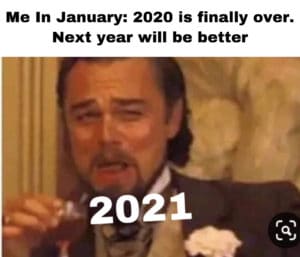2021 may not be a year of recovering from 2020, but instead extended pressure on the remaining producers.
January 4, 2021
By: Bobby Casey, Managing Director GWP
While many are happy to leave 2020 in the rear view mirror, if we learned nothing from the Great Depression, government interference and its moral hazards take a long time for the country to convalesce, and even then we’re left with a permanent limp afterward.
Last year was the year of erasing jobs and creating dependency. This year is when the real costs start to settle in.
We will very likely see new taxes in 2021, varying by state to make up for the dramatic revenue shortfall. In fact, the most counter-intuitive reality of this year is: in a down economy, when people can scarcely afford more taxes, the government will spend more rather than tighten its belt.
Tax hikes are predictable, as are extensions on government programs like unemployment. In some states, you could even see extensions of eviction moratoriums. The IRS will also start to shake out the couch for some extra revenue.
Remember how the CDC suddenly gained the power to decide when landlords could start collecting rent or start the eviction process with tenants delinquent in payment. The US congress issued a moratorium through July 24, 2020. The CDC decided to extend that through the end of 2020.
President Donald Trump then signed a relief bill that extended an eviction moratorium through to the end of January 2021.
New York passed a bill deferring most eviction proceedings for 60 days, and imposing a moratorium on evicting residential tenants who make a declaration of COVID-related hardship until May 2021.
Oregon voted to extend their state’s eviction moratorium until June 30.
Last September, California passed an eviction moratorium for tenants who paid at least 25% of their rent. They are considering a proposal to extend that policy through the end of 2021.
No matter how you look at this, from the left or the right, these extensions are clearly just kicking an inevitable can down the road. At some point there will be a reckoning: what happens when the moratoriums are lifted? And what becomes of the missed payments?
If the landlords aren’t compensated, it becomes public housing at the direct expense of private property owners. If they are compensated by the state, they became unwitting providers of government housing. If they are paid back by their tenants, then it was just a temporary deferment.
However, how will renters who were struggling to make rent each month to begin with possibly come up with months of back rent while also paying each month? It becomes a similar gimmick to that of “One Year Interest Free” on large ticket items. Yes, you get a year off without having to pay any interests or monthly payments, but once that year is up, you get slapped with back interest and at a really high rate and it becomes a preposterous situation of debt.
This is uncomfortable for all parties except the politicians who have no idea how this works. The longer they drag this on, the worse it will be on the other side of lifting the moratorium.
This isn’t the only awkward predicament. Part of the last Omnibus Bill that passed through Congress included $11.92 billion to the IRS, an increase of $409 million compared to FY 2020.
How will the IRS be prioritizing its efforts with this new-found windfall?
The Bloomberg headline reads: IRS Plans a 50% Ramp-Up in Audits of Small Businesses Next Year
While audits are proportionately low when it comes to LLCs (0.00004% of filings audited) and S-Corps (0.01% of filings audited), this is the wrong year to decide to hunker down and play catch up.
Amazon and Netflix became the beneficiaries of the 2020 lock downs. They didn’t call for them, and they didn’t have some special heads up to know they were coming. But they did disproportionately benefit off 2020 even if it was by sheer accident.
I can’t blame them for being there. The fact is, were it not for them people would be much worse off now than they are. I can, however, blame government. Their edicts all but handed them profits at the expense of people’s jobs and livelihoods.
2020 was the year government at nearly every level chose large corporations over small businesses to win… or more accurately, they chose small businesses to lose.
This sort of redistribution can only be described as contrived and depraved. When jobs are arbitrarily determined to be essential or non-essential, jobs are lost. When you reign down mandates and edicts at a cost too exorbitant for small players to afford, while larger corporations can pivot on a dime, businesses are lost.
Depending on the industry you look at anywhere from 45% to over 60% of small businesses are expected to close for good. I get that the IRS hasn’t had the bandwidth to perform the audits it would like, but this is the wrong time to try and strong arm a sector that has been hit ruthlessly by the government’s mandates.
Raising taxes, cracking down on audits and collections, pretending that people don’t have bills to pay and those who are owed don’t matter is going to drag this thing out for years. Consequences tend to compound interest too. How that will look is far more disconcerting that anything that has happened in 2020.
The goal posts continue to move. Who knows what comes next?
Click here to schedule a consultation on how you can protect your assets from overreaching governments, or here to become a member of our Insider program where you are eligible for free consultations, deep discounts on corporate and trust services, plus a wealth of information on internationalizing your business, wealth and life.


